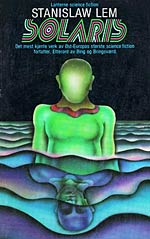
![]() Bormgans
Bormgans
7/8/2020
![]()
(...)
It's curious that our relation to alien intelligence isn't upfront in the movies, but then again, maybe it is not. I thought the strongest suit of Solaris was the character of Harey - or 'Rheya' in the translation I read. She is quite an invention, and her nature has spawned essays like this - full of spoilers, beware. How would you define the personhood of something that springs out of existence from an alien entity's registration of another person's memories - a body without memories of her own life except through the eyes of that other? Her trajectory and growing self-awareness is painted only sketchily, but it is a very powerful portrait nonetheless.
As such, Solaris - to me - was not about mental problems or the lonely hell of a space station with a spooked skeleton crew. It is a story about lost love. Kris Kelvin's relation to Harey is the major emotional draw of the book, and it is understandable that directors chose that focus over philosophy. At the same time, Lem implicitly asks a very hard question: what do we love? A person? Or a body? Maybe such dichotomies are false. Or maybe that question is the same question Snaut ('Snow') asks about halfway the book: "What is a normal man?"
(...)
https://schicksalgemeinschaft.wordpress.com/2020/07/08/solaris-stanislaw-lem-1961/